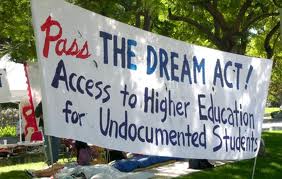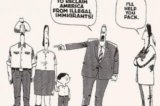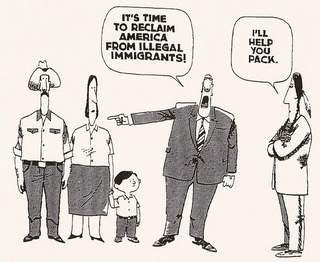 Angela has been living and working in New York City for ten years. She has not only worked hard and long hours here but studied for her highschool diploma. Angela is “undocumented” the new term (in the late ’70s) for “illegal aliens.” She has a thirteen year old son back in her home town who she hasn’t seen for ten years. Like millions of immigrants — legal or not — her earnings in the U.S. help to support her family back home. She also talks about the discrimination that undocumented workers face. How her most recent boss threatened to call the IRS if any of his employees made demands. Angela has just lost her long legal process to fight deportation. In the two years before this progam aired, some two million illegal immigrants have been deported from the U.S. President Carter has proposed a new bill to provide amnesty for those who have been in the country for seven years, but that bill is stalled in vortex of the perennial arguments over immigration.
Angela has been living and working in New York City for ten years. She has not only worked hard and long hours here but studied for her highschool diploma. Angela is “undocumented” the new term (in the late ’70s) for “illegal aliens.” She has a thirteen year old son back in her home town who she hasn’t seen for ten years. Like millions of immigrants — legal or not — her earnings in the U.S. help to support her family back home. She also talks about the discrimination that undocumented workers face. How her most recent boss threatened to call the IRS if any of his employees made demands. Angela has just lost her long legal process to fight deportation. In the two years before this progam aired, some two million illegal immigrants have been deported from the U.S. President Carter has proposed a new bill to provide amnesty for those who have been in the country for seven years, but that bill is stalled in vortex of the perennial arguments over immigration.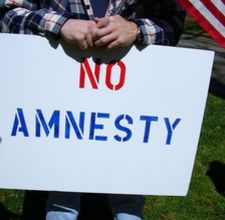
A four part series
Angela’s story was part of a four part series that I produced for NPR’s All Things Considered in 1979. The other pieces report on Alejandro, who paid $500 to cross the border from Mexico (he is part of the wave that was just beginning from Pueblo, Mexico). He explains the hard scrabble life of his family back home and why he must make his way here to help them. However, three months after he arrived the IRS showed up at the apartment where he was staying. He was sleeping, wasn’t thinking clearly and jumped out the window. It was a six story jump. He is now paralyzed from the waist down. He has spent the past seventeen months in a hospital in the Bronx. Now he has been given deportation papers. Alejandro’s situation seems tragic if we understand the history of immigration laws in the U.S. In the early 1960s the Bracero program encouraged 400,000 Mexicans to come and work in the U.S. But in 1968 a strict quota was legislated for immigrants from Latin America and the Caribbean.
 Marie is from Trinidad. She was lured to New York by all the stories of freedom, opportunities and mix of cultures that seemed light-years away from her traditional roots back home. She has the advantage of coming from an English speaking country and has worked as a secretary for eleven years, but now with the new anti-immigrant sentiment she is having a difficult time finding work. Employers hear her accent and ask about her “green” card. Now she is facing deportation and is mulling over the idea of finding a husband so she can get a “green” card.
Marie is from Trinidad. She was lured to New York by all the stories of freedom, opportunities and mix of cultures that seemed light-years away from her traditional roots back home. She has the advantage of coming from an English speaking country and has worked as a secretary for eleven years, but now with the new anti-immigrant sentiment she is having a difficult time finding work. Employers hear her accent and ask about her “green” card. Now she is facing deportation and is mulling over the idea of finding a husband so she can get a “green” card.
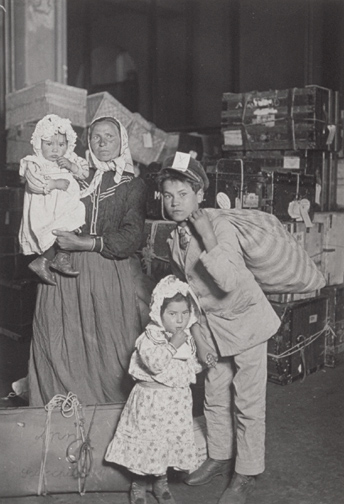
Theodore is from Haiti. Many Haitians who have come to the U.S. have argued that they faced political persecution back home and that qualifies them to apply for amnesty, but Theodore describes the painful poverty of his family back home – people without toilets or refrigerators. He is an economic refugee — a category that the IRS doesn’t recognize as qualifying for amnesty. Since he arrived in New York and somehow got a social security card he has worked long hours at a series of low-paying jobs. At one, while pouring molten lead into molds without protective clothing, an explosion sent him to the hospital for several weeks. At other factories he filled jars with cold cream, made brassieres, and pressed holes in metal, often working six days a week for ten or twelve hours. He insists that he pays taxes as they are deducted from all of his paychecks.
Employers vs. Unions
The classic argument made by employers is that immigrant — and they mean illegals — are willing to do work that American citizens will not. The Unions claim these employers are undercutting American jobs by hiring illegals who will work for less, without protections. It is an argument that continues today.
A long history of restricting immigrants
How did the country of immigrants end up with these restrictions for immigrants? The Constitution makes no distinction between citizens and non-citizens. But thirty years later, the Alien and Sedition Act begins the long journey of qualifying who can gain entry. In the 19th Century laws were passed to prevent Chinese immigration, but only after the railroads were built. In 1882 a head tax of 50 cents was charged and in subsequent years restrictions were put on anarchists, idiots and lunatics. In the course of the 20th century various restritions and quotas were designed to keep the Anglo-European landscape in tact. A literacy qualification would exclude Asians. Soon prostitutes and communists were excluded.